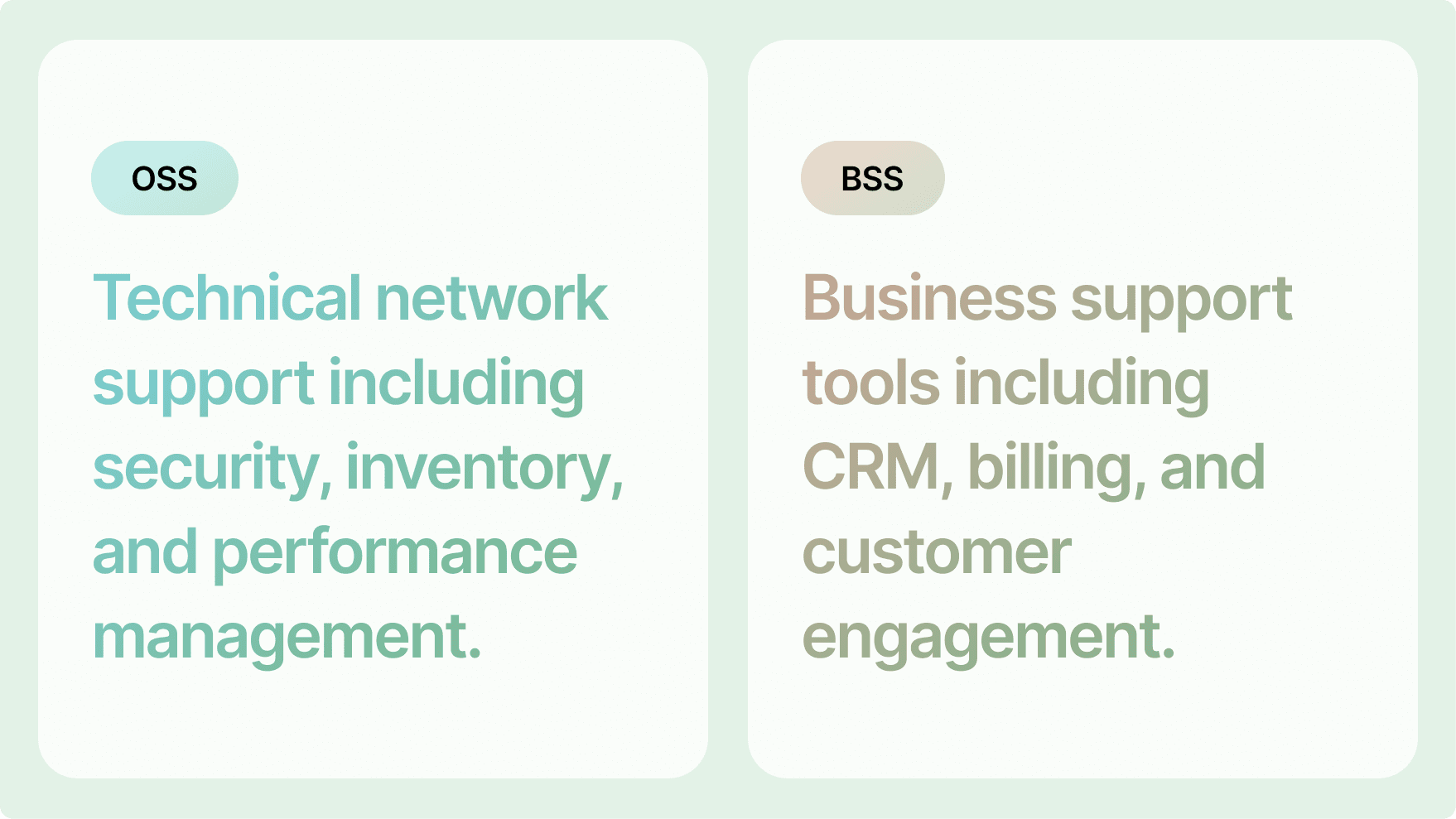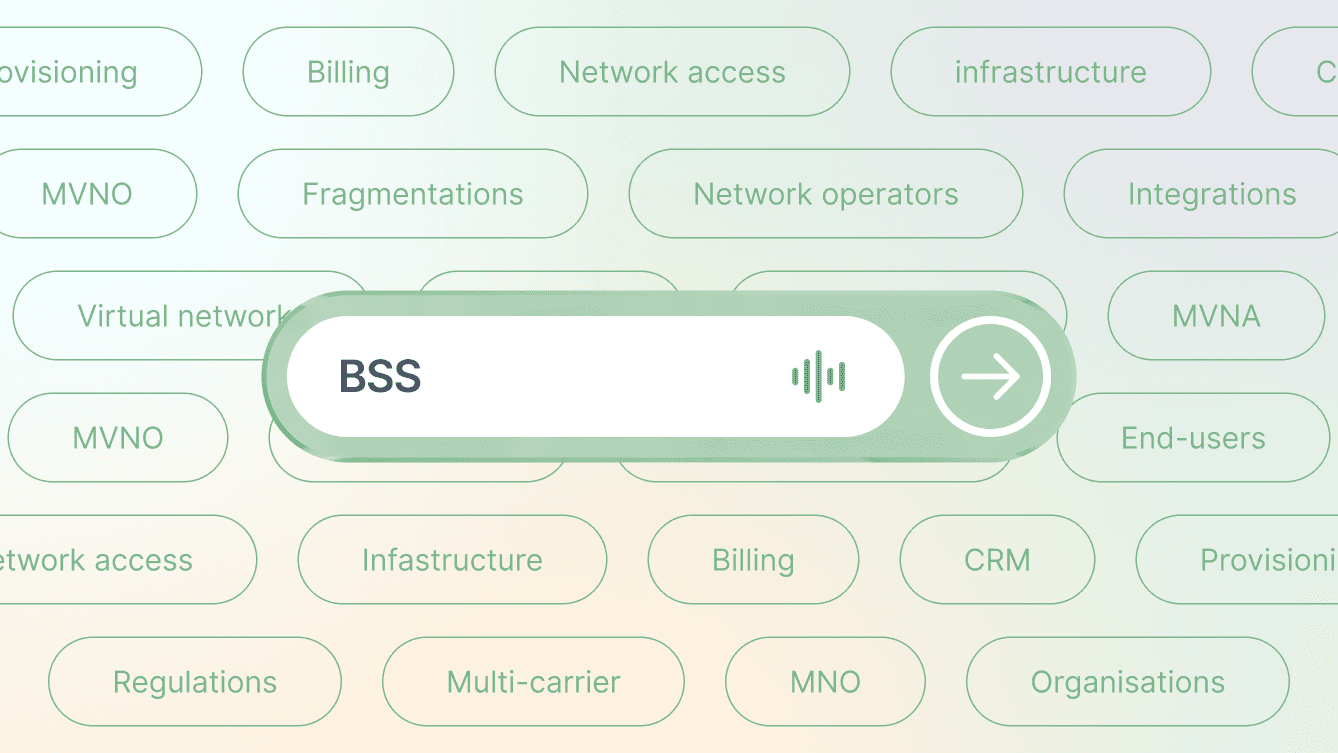Business Support Systems (BSS) and Operational Support Systems (OSS) help mobile providers deliver seamless services to their customers.
In this article, we’ll dive into the functions of BSS in telecom and explore their importance in the industry. We’ll also look at how advances in automation and AI are transforming BSS, enabling mobile service providers to lower costs, streamline operations, and deliver their services more efficiently.
Key components of BSS in telecom
BSS is an umbrella term for the systems that enable the business and customer-facing side of a telecom company. This includes:
1. Order Management
BSS manage the entire order lifecycle, from initial order capture to fulfilment. In telecom, this includes facilitating subscription activations, tracking orders, managing inventory and provisioning SIM/eSIMs.
2. Billing
Telecom billing systems ensure accurate billing across jurisdictions and handle payment collection. They will also ensure that customers are provided with clear billing information.
Telecom taxes and fees add an extra layer of complexity to the telecom billing process. Telecom services are subject to a variety of local, state, and federal taxes that vary by region. The right BSS ensures regulatory compliance by automatically applying taxes and fees to each bill. Without the right software, managing these taxes would be extremely complex.
3. Customer Relationship Management (CRM)
CRM handles the customer lifecycle, from data collection to customer support. The best CRMs allow customers to "self serve" and make adjustments to their plans online without having to reach out to customer support. They will also offer AI-powered customer support, enabling mobile service providers to cut their contact rates and lower operational costs.
4. Regulatory compliance
BSS ensures mobile service providers meet industry standards by capturing and reporting data for regulatory compliance.
5. Customer analytics
Insights into payments, device usage, renewals, and churn which help mobile service providers identify opportunities for upselling and optimizing customer retention.
The difference between BSS and OSS in telecom
While BSS handles the business side of running a mobile service, OSS handles the technical side, including network performance and uptime.

Advances in automation and AI
Recent advances in automation and AI allow mobile service providers to deliver exceptional customer experiences while reducing operating expenses.
AI-powered tools provide instant customer support, reducing workload and improving response times, while advanced automation streamlines everything from billing adjustments to number porting.
Meanwhile, the rise of eSIMs has dramatically improved the customer onboarding experience, making it much easier for customers to switch networks. This has opened up opportunities for new players to win customers from incumbents.
Avoiding operational fragmentation
Operational fragmentation is a common challenge in telecom. Relying on multiple vendors for CRM, billing, and network management often leads to inefficiencies and compatibility issues. For example, a change in the billing system might disrupt customer service, causing delays and frustration. This lack of cohesion also makes it difficult for telecom operators to remain agile and respond quickly to market changes.
By adopting an end-to-end solution, such as Gigs, telecom providers can unify operations, minimize inefficiencies, and accelerate innovation, ultimately improving customer experience and business performance.
The Gigs advantage
By combining wholesale connectivity, BSS, OSS and multiple telecom functions in a single platform, Gigs provides businesses with everything they need to run a world class mobile service, all in one place.
With unparalleled automation, market-leading UX, and superior conversion rates, Gigs not only minimizes launch costs but also ensures you offer the best service to your users.
With our multi-network API, you can embed connectivity services - including local phone plans in multiple markets and travel eSIMs - seamlessly into your product in a matter of weeks.
To find out why leading tech companies like Nubank choose Gigs to launch connectivity services to their millions of users, get in touch.




